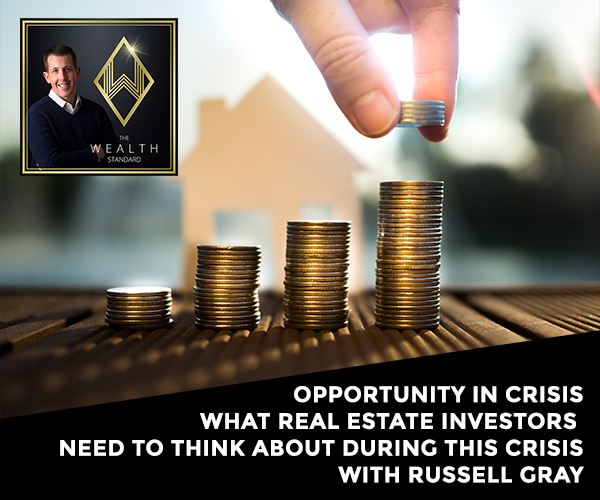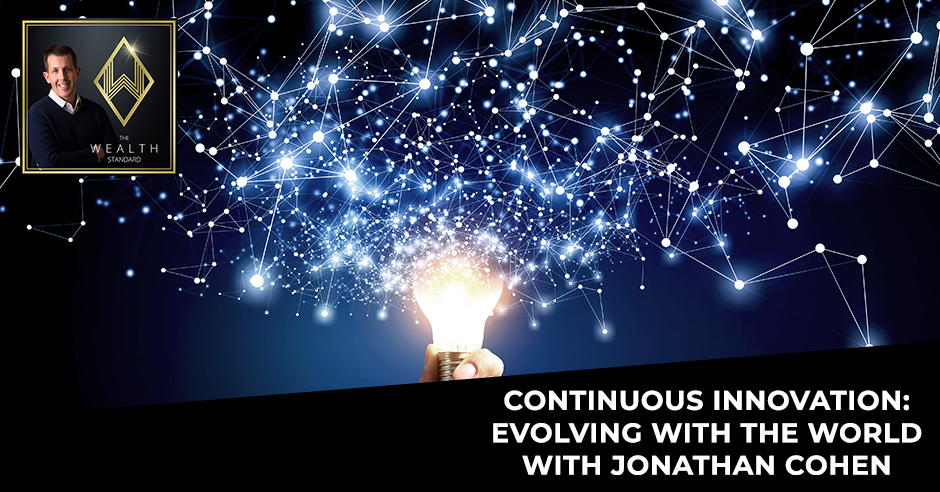Opportunity In Crisis: What Real Estate Investors Need To Think About During This Crisis With Russell Gray
Podcast: Play in new window | Download
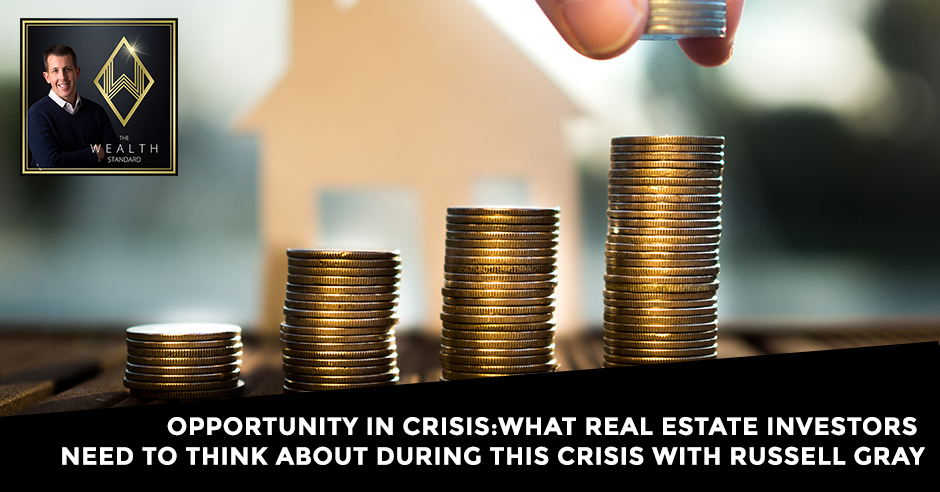
There’s no getting around the fact that we are going to experience a crisis in the financial system, and no amount of government efforts to introduce liquidity is going to solve it. How can you survive, nay, thrive amid a crisis of this unprecedented scale? Joining Patrick Donohoe on the podcast today, financial strategist Russell Gray thinks this is the best time to focus on our personal investment philosophy. Russell is a co-host of The Real Estate Guys™. He has been a financial strategist since 1986. The financial system is going to behave as it will, and we hardly have any control over anything that goes on within it. Robert sees this time as the perfect opportunity for real estate investors to educate themselves and build their networks to be at their best form for whatever comes next. In every crisis, there will always be winners and losers. Listen in and learn about the things you have to consider if you are to thrive in the REI business amid a crisis.
—
Watch the episode here:
Listen to the podcast here:
Opportunity In Crisis: What Real Estate Investors Need To Think About During This Crisis With Russell Gray
I’m excited for you to read this interview with a good friend of mine, Russell Gray. Russell is one of the Real Estate Guys Radio Show that I believe is still the longest-running real estate investment show. They’ve been on air since 1997. I got to know Russell back in 2010. I was invited to be a faculty member on the Investor Summit at Sea, which is more than a week-long cruise where investors from all over the world get and learn together. It’s an interesting dynamic. I was a faculty member there for nine years and there were other famous speakers as well. Robert Kiyosaki has gone on their multiple times, G. Edward Griffin, Peter Schiff, Douglas Duncan, who is the Chief Economist of Fannie Mae, Chris Martenson, and countless others. There are some experiences that changed my life. I did record podcasts when I was on the cruise.
I’m going to cut to the interview. Before that, thank you for the support of comments, questions, likes, shares. It’s been awesome. We’ve definitely had a tick-up in awareness of the show and the subsequent episodes. We’re active on Instagram and Facebook. Make sure you’re following us there, as well as a subscriber to the email list. We’re actively sitting on messages there and head over to TheWealthStandard.com. The resource section that I’ve spoken about. Specifically, a program that Mike Dillard has for entrepreneurs, that’s all life. You guys can check that out the resource section at TheWealthStandard.com. Finally, at the end of the interview, I’m going to do some Q&A, some commentary based on the crazy events that are going on. I hope you enjoy the interview with my good friend, Russell Gray.
—
Welcome to this interview with an incredible guest, and he is no stranger to the show as well as other mentions in writing, blogs, newsletters. He’s a good friend of mine. His name is Russell Gray. He’s mentored me, I think it’s been several years.
We met each other in the wake of the 2008 crisis. We were both in rebuild mode.
Through the experiences of seeing how the Real Estate Guys Radio took off, how you guys have expanded your network to all ends, it’s been impressive. I appreciate it. I’m grateful for the mentorship you’ve provided me for many years. I’m excited to extract out of you some of your insights into what’s going on with this new world and the new economy. On the thick of it, at the same time, there are some signals that would lead us to potential conclusions. I’m grateful for your time and grateful for your expertise. I would also say that the RealEstateGuysRadio.com is an incredible resource, subscribe to their podcast. Russ also writes personally a newsletter. It is well-written, full of good insights. His mind took off after 2008, 2009, in my opinion. He became an incredible writer. That being said, I welcome you to this interview.
It’s great to be here. They can decide after they’ve heard me ramble here a little bit if they think I’m worth somebody they want to listen to more, but let’s get into it.

Financial Crisis: The health crisis is going to create an economic crisis, not because of the health crisis itself, but because of the reaction to it.
The consensus of our audience is on edge in a sense where things have been disrupted in all sectors. We’ve been hit with a black swan that no one anticipated, especially the response of the government to it, which I believe is a big earthquake. It’s going to have some ripple effects. First off, because we haven’t connected in a while, how are you processing the last couple of months when it comes to the economy and your role in providing guidance, insight, and wisdom to a broad audience?
To understand the answer, I’m going to tell a bit of the story. Back in 2008, it’s no secret. Going into 2008, I was in the mortgage business. I had accumulated a lot of properties all over the place. I was levered to the hilt, but I had great cashflow from my mortgage business. I was in the hottest industry at the hottest time. I looked like a genius, then all of a sudden, what happens is life hands you a bunch of humility, but I realized is that I was only structured for sunshine. When the mortgage industry imploded, it took my income with it, which was supporting this huge portfolio over-leveraged properties that were in many cases sitting empty.
I was speculating on real estate asset prices instead of focusing on investing in the production of income, which seemed boring at the time. Equity was easy money and I still believe in equity, but equity is a byproduct. Cashflow, not just rampant speculation, so there is a difference. I didn’t understand that back then. Coming out of that, I dedicated myself to understanding how could a guy like me that is relatively attentive, studious, not see such a disaster calming when I was in the epicenter of it. The net result of it was I had my nose too close to the ground grindstone. I was myopic.
We went out on a search and we started looking for people who had accurately predicted what had happened and got it right for the right reasons. One of those people, Peter Schiff, who we became friends with. He’s always been a part of our Investor Summit at Sea since 2013. Peter was a guy who began that process of explaining. I’d already read G. Edward Griffin’s book, The Creature from Jekyll Island, somebody else that we’re mutual friends with and whose book that we’ve read and it changed our lives. It began to understand the way the financial system operated and what it meant on a human level. That’s one thing to understand is how the system operates.
You may not like it. You may not think it’s great, but at the end of the day, it doesn’t care what you think of it. It’s going to behave the way it’s going to behave. Sometimes we have to set aside our political or economic proclivities and accept it for what it is and try to navigate it. When this thing hit part of that 2008, the recovery process was building out our network of smart people that we were around. Robert and I were always among the smartest people in the rooms that we were in going up to 2008. After 2008, we made it our mission to be the lowest guys on the totem pole to be around people much smarter, better connection, much wiser, much more efficient, and much more articulate than we were. It cost us a lot of growth.
Two of those guys were Chris Martenson and Adam Taggart at Peak Prosperity. They were at the forefront of understanding how bad this Coronavirus crisis was going to become. I was on the phone with Adam and he told me. I started to pay attention to. I was less concerned about the health crisis component of it. I was more concerned about the economic crisis component. What I was interested in was the chain of events. You asked me the question, how did I process it? I’m a big believer that before you can process a lot of content, there’s a lot of noise, a lot of information, a lot of opinions coming at you from all angles, I needed to set a context.
The context for me is looking at what happened. He said, “The health crisis is going to create an economic crisis, not because of the health crisis itself, but because of the reaction or arguably the overreaction to it.” Whether you think they were handling it responsibly or whether they went way over the top or they’re not doing enough, it doesn’t matter what you think. They’re doing, what they’re doing. It effectively has shut down the economy. It went from a health crisis to an economics crisis. What is an economic crisis? It’s a cessation of commerce.
That means no revenue to businesses, no paychecks to employees. What does that mean? It means that debts can’t be serviced. It goes from being at an economic crisis. It has the potential and arguably is going to metastasize or spread into a financial system crisis where it threatens both the banks and the bond markets. The Fed, in anticipation of that, is printing money like nobody’s business, trying to prop up the lack of economic equity activity. It’s like having a heart attack and your blood stops pumping by injecting a lot more liquidity, which is like giving somebody who’s had a heart attack a transfusion and hoping the pressure alone will force the heart to start to beat. It’s not going to happen.
The financial markets are in trouble and that’s what triggered the 2008 crisis. The job loss of 2008 was a byproduct of the collapse of credit markets, which caused a cessation of commerce. Here, the job market, which was the cessation of commerce created the financial crisis or is going to create the final answer crisis, in my opinion. That will reinforce the economics. In order to prevent this correct, what Peter calls, “The real crash,” which is going to be much bigger than 2008. The Fed is approaching it by printing trillions of dollars at a rate that is impressive, it’s not even funny. I have a question in my mind then is, can the dollar survive all of the pressure that is being put on it to prop up the system? I don’t know the answer to that, but that’s what I’m paying attention to. The context for me is understanding from health crisis to economic crisis to financial system crisis the dollar crisis. How do I see that coming? How do I position myself not just to survive it, but thrive? The flip side of all chaos is going to be an opportunity.
Let me unpack this. You established some good bullet points that we can address. Let me unpack the first idea, which is important to identify. The system is going to operate the way it’s going to operate. As much as we think that things should be this way or should be that way, the economy, and society, it is what it is. There’s only so much you can influence. Back in 2008, 2009, whether things should have been set up a different way or shouldn’t have, that’s beside the point. It comes down to what are you going to do with what happened? There’s a similar environment where there’s a lot happening that’s outside of your control.
There is a lot that maybe could have been done to prevent it or should have been done, whether it’s from health or an economic standpoint, but that’s beside the point. It happened. You don’t have any influence over it. What are you going to do now? You led to what happened was people stopped, period. School, work, spending, the list goes on, the economy is based on spending. Businesses need money and revenue from spending to pay their bills, to pay their taxes, to pay their employees. That disruption has created a void, I would say, of capital enough to pay bills, service debts.
The Federal Reserve has stepped in and it’s been around the world too. Central banks have filled that void. Because they filled that void, things are continuing on. Hopefully, things open up and so forth. At the same time, there are some fundamentals that I don’t think most people are aware of. As we look at leadership and how our education system is to teach us that there are those that are smarter than us that we should listen to. I believe that there are a lot of, why is people at the head making certain decisions? Most people are just following. Let’s talk about the unintended consequences or what could potentially happen because the void is being filled with artificial money, artificial resources.
You talked about unintended consequences. You could leave off intended or unintended because it doesn’t matter, it’s just consequences. It’s cause and effect. About the financial system, I think of the old game I played when I was a little kid called Mouse Trap. In Mouse Trap, a chain of events would happen. You put the little marble in the chute and it would go down. It would hit the boot that would kick the thing and another marble would go. Anyway, it went through this whole convoluted process, cause and effect, until ultimately the trap came down on the mouse. When I look at the economy, it’s that way. One of the things that I spent a lot of time doing was understanding the way the system worked so I could begin to anticipate when I saw a trigger event, I could follow it up through the chain and have more advanced notice on what I thought was coming.
Way before the Coronavirus crisis happened, I go back to my friendship with Chris Martenson and Adam Taggart. Back in September of 2019 in my daily perusal of the news. I was looking for what I call clues in the news. I saw this thing happening in the repo market. I wasn’t that familiar with the repo market, but I saw that the Fed was injecting hundreds of billions of dollars into this thing called the repo market. I said, “I don’t know what’s going on under the hood, but there’s a heck of a lot of smoke coming out. Something’s going on down there.” I did a little homework on it. To keep it in layman’s terms, in short, the repo market is like a pawnshop for banks to take their treasuries, which are their assets, like you hocking a watch or a piece of jewelry when you’re short on cash.
They show up at the repo market and they give the pawnshop, the pawnbroker the treasury and they walk away with their cash. They go put their cash fire out and then they come back and buy back their assets. They don’t have to give the asset up. They don’t have to write it off on their financials, which is what that’s all about is doctoring their financials so that their insolvency it can be hidden. We could talk about mark to market and all kinds of things that they changed in order to hide. There are many things in the accounting system they use to hide the weaknesses in the financial system. You don’t know what’s going on, but if you watch for these clues, so that happened.
We called Chris and Adam up and said, “I don’t know what this means.” They said, “We don’t know what this means either, but there’s clearly something wrong.” There was a cash problem brewing. There was a banking problem brewing in September way in advance of this. My antenna was up at that point and we wrote a few newsletters. I talked about it and did a couple of shows on it. I’m not being an expert but encouraging people to pay attention to it. It started there. The other thing too is after going through reverse-engineering the implosion of the 2000 financial crisis, one of the things that I became aware of was the hypothecation of bonds and what derivatives were.
Warren Buffett famously wrote in his Berkshire Hathaway letter to his investors that he considered derivatives to be weapons of mass financial destruction. This was back in the late ‘90s, it was oppression. With that said, what it means is that people who are speculating in the bond markets, and the bond market is the largest market except maybe the currency market, but the bond market is ginormous and much bigger than the stock market. Everybody pays attention to the stock market. Few people pay attention to the bond market unless you’re a financial geek. In the bond market, prices of the bonds, the value of the bond is inversely correlated to the yield on the bond.
If I want to drive interest rates down if I’m the Fed, then I’m going to bid up the price of the bond. For real estate investors, that’s like bidding up the price of an income property lowers the capitalization rate. It lowers the yield on your investment. It’s the same concept. When you understand that people don’t buy bonds for the yields because the yields are nonexistent, in some cases worldwide, they’re negative. Why would anybody buy that? They’re speculating on the bond price because they know that the central banks are committed to driving interest rates down.
They’re front running the Central banks, knowing if I can buy a bond before a Federal Reserve bond-buying program, then I can turn right around and flip it to the Fed at a profit. You say, “Why would the Fed continue to push interest rates down?” It is much bigger than simply stimulating the economy, making it easy for already impoverished borrowers to borrow more. It’s more than about making money available to corporations to do stock, buybacks programs so that they can go to the stock market. It’s even greater than trying to simply supply and overspending federal government with gobs of money so that they can buy votes, pay for programs, and do whatever legitimate activities that they do.
At the end of the day, they are holding together the financial system. Here’s how that works. If I have a bond on my balance sheet, it’s my asset. If you’re the bond issuer, it’s your liability. It’s the same relationship people have with their banks. If you have a bank account, it’s your asset on your balance sheet, but to the bank, it’s their liability. They owe you the money. That gives you something called counterparty risk, which is rife in this system. You’ve got this asset on your balance sheet and you decide, you need some liquidity. Whether you go to the repo market or anywhere else, you can borrow against that. When you borrow against it, you do it using margin. Now I’ve borrowed against that bond on the margin the way you could on your stock portfolio. The problem you have is if the bond price goes down. Why would it go down? If interest rates go up, you get a margin call.
The margin call means that you either have to post more cash, which means you have a cash crisis, or you’re going to sell the bond at a loss. Take the loss on your balance sheet and show your insolvency. You’ve got to find a way to raise cash. A repo market is a place that you can do that. That activity in the repo market was like a warning sign, a canary in a coal mine that there were things going on in the bond market. The Fed is obligated to try to continually keep interest rates suppressed in order to prop up the bond markets where they get a repeat of 2008. The difference is the number of bonds, the amount of debt, and the number of derivatives in the system dwarfs what we had in 2008. Therefore, the impact of losing control of that would dwarf the impact that we felt in 2008.
I don’t have any way of knowing this for sure, but I suspect a lot of what’s going on is trying to figure out how to keep the bond market going because when they tried to raise interest rates, Peter Schiff predicted they’re not going to be able to do it. They’re in the monetary, “Roach Motel,” as what Peter calls it. The good news is especially for real estate investors, it means you’re going to be in an environment of low-interest rates for the foreseeable future. You need to be able to use debt to make money. That’s a whole investment strategy in and of itself.
It means that if you’re a saver if you’re investing in hoping to get a yield on your savings, probably going to end up being a loser. It’s why Robert Kiyosaki says, “Savers are losers.” There’s a lot there. The main concept to understand is to pay attention to the bond market, understand the inverse relationship between interest rates and bond prices. The pressure on the Fed in many areas, but mostly in propping up the financial system. It’s got to keep those bond prices down or bond yields down to keep the bond prices up. They have to print money to do it. A lot of pressure on the dollar.

Financial Crisis: Residential real estate is a great place to be because people will always need a roof over their heads.
This is a worldwide phenomenon. It isn’t just the United States problem. Some of the reactions and that impact on real estate in general, which I think is the only tool that the governments have which is to continue to push liquidity into the system, money into the system. It’s in the form of a stimulus check to people, so they can pay their bills. That’s most likely going to continue with multiple stimuli. If that’s the case, interest rates are going to stay low. At the same time between mid-February, March maybe, going into the summer, the disruption caused many businesses to struggle as well as people. That impacts whether they’re rents, mortgage payments. Let’s talk about how the disruption it has caused some challenges when it comes to people being able to serve as debt or to pay landlords. It ultimately is going to impact real estate prices and create opportunities, but also some reshuffling of resources where some real estate may not be as valuable as it once was given the disruption.
There’s a ton there when most people think of real estate, especially people who aren’t in real estate as investing. They think about houses and apartment buildings. That’s the easiest thing to talk about to start with, but retail was already in huge trouble with the Amazon effect. Things going on there, it was a boon to industrial with warehouses, distribution centers, and markets that supported that. There are always winners, there are always losers. There are shifts sometimes. When you look at residential, it is a great place to be because people will always need a roof over their heads. Either they’re going to own the property or someone else is going to own the property. These people get poorer, the probability is that someone else is going to own the property who’s less poor and going to have some mechanism by which to generate income, getting a share of that worker’s productivity.
Rental real estate, income-producing real estate, residential real estate, all are predicated on jobs. I had the chance to interview Donald Trump, I only got a chance to ask him one question. When he was running for president, we were at Freedom Fest. I asked him, “Mr. Donald Trump, a lot of people look at what happened in 2008 and the financial crisis lay that at the foot of the Fed, monetary policy and government policy. What does a healthy housing market look like in a Donald Trump administration?” He gave me a one-word answer, “Jobs.” When he got into office, that was what his emphasis was on jobs. That was his big claim to fame was jobs, “I’m going to bring manufacturing back to America.” Every rally was jobs. We just lost 30 million-plus jobs. To your point, some of those are never going to come back. Human behavior has altered permanently. People have discovered they can work at home. If I can work at home, why do I want to pay $5,000 a month for a 400-square-foot apartment in New York City, if I can go live in Central Florida in a nice house, on the beach, in the sunny weather and do the same job?
There are going to be markets that are winners and losers. Landlords that are going to be winners and losers. One thing about real estate is it’s not an asset class, it’s not a commodity. It’s not like gold, currency, or oil where there’s one price for the same product universally around the world. Every property, neighborhood, ownership, and financial structure is unique. Because of that inefficiency and uniqueness, real estate is a lot more art than it is science. That’s what makes it fun. There are going to be gobs of opportunities, but there are also going to be problems and it’s all going to be predicated on the disruption of income. We have enhanced unemployment. We have helicopter money, direct infusions of cash, although you’d make the argument it’s not much. You have the Paycheck Protection Program, which is designed to keep people employed and cashflowing in that regard.
Forgivable loans and all the bad debt now with the Fed stepping in buying local bonds, muni bonds, and ETFs. In addition to treasuries, a whole lot of other things they’ve been buying any way through proxies behind the scenes cropping up the stock market. Mostly for optics because a lot of people look at the stock market as a proxy for the economy. The stock market isn’t bad, therefore, the economy is not so bad. That’s not true, but that’s the way people feel. The people in power understand how to manipulate the optics to create the scenarios they want. In this day and age, because of technology and guys like you and me being able to get out there and have a conversation whose voices would never ever be heard.
The financial system is going to behave the way it’s going to behave. We have to accept it for what it is to navigate it. Share on XIf it was mainstream financial media were our outlets, there are more people informed about what’s going on and alert. It’s harder to manipulate the optics, but you do have to avail yourself of what’s going on. Residential real estate is going to get a lot of attention from the government. Protect the resident level forbearance agreements. Last time in 2008, when everybody started to default, the banks are dragging their feet. Nobody wanted to take the hit. They were all afraid. Now, there have been many changes made to the way the banks report from the market. I talked about that activity, the repo market, and the Fed overtly. We’ve got your back, we’ll buy anything that you have so you can stay solvent.
It means that the banks are okay, and the government is stepping in right away with forbearance, anti-eviction, providing a paycheck, subsidies, subsidizing loan servicers, and propping up everybody in the food chain from Main Street to Wall Street. That even though it’s scary and you have to pay attention, there are going to be disruptions. You also, to a large degree, have the wind at your back when it comes to residential real estate because people always need a place to live. Politicians, industry, and bankers are all highly motivated to prop it up. I don’t even know exactly what that’s going to look like. To your point, they don’t always hit what they’re aiming at. However, you can be assured that you’ve got a lot of folks on your side if you’re in that space.
It remains one of my favorites in this environment. You’ve got to look at the specific deal, feel the specific market, specific management team, specific financing structure against the backdrop of your own specific financial situation and how much risk you can bear. There are going to be some bargains available in the next many months and years. It’s a good time to be aggregating capital and building your team and your knowledge. Whether you’re going to be a hands-on direct investor where you’re going to look at properties, cut your own deals, or work through your team. If you’re going to be a passive investor, buying into portfolios that private syndicators put together, which is like buying a mutual fund of properties, but you’re not buying through Wall Street. You just buying through private individuals. We have a lot of people in our world that do that. We think it’s one of the great business opportunities in all of the business, but especially in real estate.
What’s your litmus test for making a decision? Because we have biases, we try to gain a lot of insight and information to reinforce that. Everyone has a blind spot. Feasibly, the Fed could continue to print around the world and we can get back on track. You look at that being another perspective and bias. When it comes to what you had said, which I agree with, that the shift in employment where businesses are learning how to work remotely and they were forced into it. I would say experiencing a lot of success.
Some success, from what I’ve heard, and that is going to put in jeopardy potential, local markets, especially when they’re not climate-friendly. When you have harsh seasons where you can potentially move to a nicer climate. With all that being said, there are many different variables that could lead to potential opportunities. Is there a litmus test that you use to identify an opportunity and then subsequently do due diligence in a specific way, to ensure that what’s being pitched to you is in fact as much truth as possible? Their truth is to sell you the deal but to have enough truth in there, enough details, facts for you to make a wise decision.
I don’t know if I have a litmus test. I have a methodology. Robert is the host of the Real Estate Guys Radio Show. We teach a lot together. We’ve invested quite a bit together over the years. Our basic approach, number one is you need to develop your own personal investment philosophy. You have to figure out what it is you are trying to accomplish, what you’re willing and not willing to do in order to get there. That’s done based on your life experience. It’s done based on looking at other people who’ve had success and failure. I learned a lot more through my 2008 failures and all my successes leading up to that. It’s interesting because I forgot. I had mentioned my one question of Donald Trump, but I had a chance to interview him the first time in Iowa before he was a candidate. I asked him that exact question, “Mr. Donald Trump, you’ve seen good times and bad times. What did you learn in the good times? What did you learn in the bad times? If you decide to run for president, how will that help you?” He didn’t answer the last part of the question, but in the first part of the question he goes, “I didn’t learn anything in the good times, but in the bad times, I learned it’s always good to have a little cash.”
I took that to the bank literally because it is important always to make sure that you have a little cash. Anyway, you come up with your personal investment philosophy, “Am I looking to grow my capital? Am I looking to preserve my capital? Am I looking for the production of income? Am I looking for tax breaks? Am I looking for privacy? Am I looking for lifestyle?” There’s a way to invest in real estate for lifestyle. You can buy properties that you’d be happy to live in, vacation in, and rent them out when you’re not using those. There are lots of ways to approach the game of real estate. That’s number one.
Number two is whether you want to be hands-on or hands-off. That’s an important decision to make. Regardless of how you choose to do that, once you’ve got it figured out economically, you’re looking for geographic marketplaces, first of all, product niches, and then demographics. When I say the word market, I don’t just mean geographies, I mean product niches and demography also, in other words, people. For example, if you believe in the Baby Boomer generation and you’re like, “The Baby Boomer generation has been an economic driver for all kinds of industries as they’ve gone through the cycles of life.” That begs a big question, “What cycle of life are they in now?” It’s healthcare.
We have a mutual friend who teaches people how to create residential assistant living facilities, nursing homes. Not big ones, little ones, in homes. If you followed what’s been going on in the news, all the big homes are coming under attack and they were being told it’s safer because of this virus to be in smaller homes. If you’re investing in the big boxes, that’s a loser. If you’re investing in the small ones, that’s a winner. Winners and losers always. There’s a lot of people look at the Millennial generation, which is even bigger than the Baby Boomers. I want to cater to that generation. They have challenges with student debt and jobs things like that. If you focus on affordable housing, a certain lifestyle type housing that appeals to Millennials.
You get the idea, so you’re going to figure out your market. You want to figure out geography where you are going to have good economic drivers more than one. Back when shale oil fracking and all that was the rage before we overproduced and oil prices crashed. It was not oversupplying, it was a collapse of demand because of the shutdown. Be that as it may, the markets that are primarily dependent upon oil and oil production, as the oil prices crashed, they didn’t have another leg to stand on. They were a one-legged stool up in North Dakota and places like that. We never got involved in those markets because they weren’t diverse enough for us.
You look at the market next, then you look at the team. If you’re investing in the production of income over a period of time in a market, the most important person on your team is your property manager. That’s the person who’s responsible for producing the income and whose income, if the compensation structure is correct, is directly indexed to the performance of the property. Now you have aligned interest. You don’t have a broker who’s trying to sell you a hyped-up, glossy pitch deck and get you to buy. Then they move on with their fat commission and you’re left holding the bag.
I liked to work with property managers. Once I picked the niche in the marketplace, I work with property managers to try to figure out who I am going to hire to manage the properties. I ask them what markets and specific neighborhoods I should be in. I had them help me find the property. Now, I’m getting someone. I can always find it a broker to represent me. A lot of times they’ll have relationships, but I think property managers. There’s a lot of talk about unsung heroes of frontline heroes in different industries after 9/11, it was the first responders.
The Coronavirus, it’s the healthcare workers. In real estate, it is the property managers. They’re the unsung heroes. You focus on that. That’s the approach. The financing approach in nowadays environment. Could interest rates go lower? They could, but I don’t think they can go lower. Locking in long-term financing is a smart move. If you borrow long and cheap to control an asset, it’s likely to be the beneficiary of inflation, we may get a little deflation to start with. It may drop before it goes up. The long-term history based on the economy is built on and the way it’s operating. The people are pulling levers. Like the book says, “Equity happens.”
Over time, prices are going to go up. If you fix in that dollar for the long haul spread between what it’s worth in dollars, nominally worth, not in utility. It’s still going to be a three-bedroom, two-bath. Nothing’s going to change in terms of how useful it is, but it could go from $50,000 to $500,000. If you bought that with a $40,000 mortgage, the inflation makes the debt atrophy. It makes it go away. People don’t realize that when it comes to a potentially inflationary environment, the safest best investment you could make is leveraged real estate because you acquire a cheap long-term debt fixed. You secure the rental income to service the debt. Tax breaks to mitigate especially with nowadays’ Tax Code and the bonus depreciation.
You only have a fraction of your own money, maybe 20% 30%, which means you could endure a lot of deflation before you take a hit, as long as you don’t lose the property. Even if you bought a property for $100,000 now, 30 years from now, it was only worth $50,000. If you put $20,000 down and the tenant paid off the mortgage, at the end of the day, you still own a $50,000 house in 30 years. You’re up in dollar terms. More importantly, in any environment at whatever price point, a home that’s paid for that’s generating rent is a real valuable asset. Real estate works in this environment, but you do need to be careful in your market selection especially in your team selection and your financing structure.
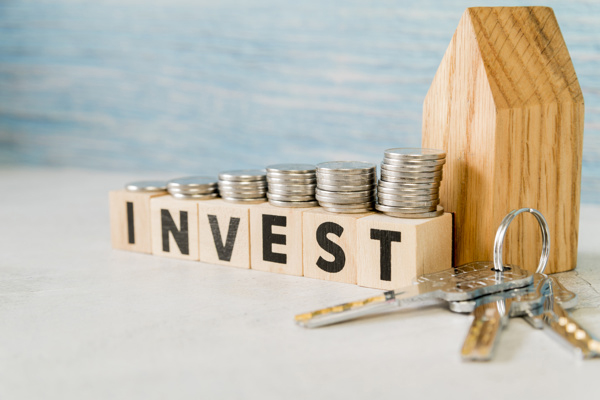
Financial Crisis: Think about what you want to do with your capital and decide on your personal investment philosophy.
The philosophy of three-bed, two-bath goes to three-bed, two-bath in a home office. That maybe is a point for another conversation.
There are a lot of opportunities in that regard as you could make the argument in some neighborhoods. There’s a lot of opportunity in one-story houses because Boomers can’t climb stairs. This is you get to understand how your customer uses property and what they need from it. Giving them what they need. To your point, from internet connectivity to workspace or workout space. I live alone and I have a five-bedroom house, but I have a studio in one room, an office in another room, a bedroom in another room. I have a den or reading room, and then I have a guest bedroom because I have a family that comes to stay with me. Then I have a big loft area where I have a gym. I can live a lot of my life productivity in my own home. It doesn’t feel like it’s a big house for a guy living by himself. There are a lot of things going on it. There’s going to be more demand for folks to have more space, which is a trend is shifting, a little bit from where we were headed prior to the Coronavirus.
All real estate is appeasing demand. Demands, tastes, preferences, they’re always changing. Keeping a pulse on that is important. One thing I wanted to pick your brain on. Going back to 2008, 2009 and I’m assuming that some people that are reading now, there are properties they do own that may not be able to weather this storm. Even though there may be liquidity in the bank account of the investor, how do you approach vacancy? How do you approach when you decide to either supplement the mortgage with your income, with liquidity, or maybe the property is it’s time to let it go? I’m assuming similar decisions are going to be made now. What would you have done differently if you were to go back during that period? What would you recommend based on that experience to those that are going to potentially face out in the future?
First of all, you want to make sure you have adequate liquidity. I had none, I was 100% dependent upon healthy credit markets across everything. I brokered debt to generate income. When credit markets collapsed, I had nothing to sell. I operated my business on my credit lines. When those credit lines got shut off through no fault of my own, just banks limiting their risk and a collapsing credit, all of a sudden, I lost operating capital. That limited my ability to shift the focus of my business and develop income streams. On a personal level, I had a lot of credit card debt. I was carrying a lot of debt because I felt like paying it off. I had higher-yielding uses of capital. Putting it in a business, putting it into properties. It all penciled on paper. Businesses do a thing called a SWOT analysis: Strengths, Weaknesses, Opportunities, and Threats.
Every prudent investor should do that. It’s one of the things that I learned and would have done. I wished I would have done is looked at everything I was doing and do a SWOT analysis. It would have helped me see the things that I had to work on with, so that when the stuff hit the fan, instead of being in panic mode. Blair Singer says, “When emotions run high, intelligence runs low.” When you’re panicked, your brain freezes. I could not see all of the resources I had available. All I can think about is what I didn’t have and what was going wrong. By the time I woke up out of the fog, some of my assets had atrophied or been completely lost. I wasn’t able to react, not because I didn’t have things to work with, but because I didn’t have the mental capacity and the emotional strength or the right advisory team to help me see it, so strengths.
Weaknesses, you always want to be aware of your weaknesses. You want to be aware of your individual weaknesses as a person. Your weaknesses in your personal financials and your portfolio. If you have your own business and if you have a job, that alone is a weakness because you don’t have control. One of the most resilient things you can do is at the least create some type of side hustle. Give some serious consideration in figuring out of how to start a business that you want to control or more than one. That is a whole art unto itself. Be aware of your weaknesses. You want to do that for each and every property on an individual basis. You’re going to look at the market, you’re going to look at the team, you’re going to look at the demographic you serve and you’re going to look at the financial structure. Ask yourself, “Is this a strong property? Is it a marginal property? Is it a dangerous property?”
The flip side of all chaos is opportunity. Share on XYou want to know to clear the deadwood. You want to, in a market like this, jettison your marginal properties and then reinforce your stronger properties. Better to only maintain 20% or 30% of your portfolio than try to hold onto 100% of it and lose 100% of it. That was one of the other things I did. I tried valuing to hold on like a lot of stock traders do. I traded stocks for a little while and studied stock trading. I don’t advocate it as a way to make money or to maintain certainly. It’s great for understanding investor emotions and experiencing investor emotions. I had 37 straight consecutive winning trades, but the 38th trade I could not take the loss. I could not admit that I made a bad trade. I wrote it all the way down to the bottom. I lost way more money than I should have. It was simply because of my own pride and unwillingness. As long as I don’t sell, I haven’t taken the hit. Robert calls this zero-sum thinking.
When you look at your portfolio, whatever you’re doing, you say, “If I didn’t already own this, would I buy it now? If not, then why are you keeping it?” Sometimes you are holding a position because you say, “It’s going to come back.” The shortest path to coming back might be a different property, a different market, maybe a completely different investment or investment strategy. You got to keep an open mind to using what the market will give you. Strengths and weaknesses, that transitions into opportunities. Opportunities are a combination of what the market is giving you and what you have to work with. That’s how you do strategy. What’s available to me both that I have control over and things that are available to me that I can get in the marketplace?
Threats are things that are directly glaring up. I have a process when threats rear their ugly head. The first step is triage. I’ve got to stop the bleeding, nothing matters. It’s urgent. The first priority is anything having to do with survival. The next thing is rehab, which means I’ve got to patch things up and get a stable base. I can’t get stronger until I reinforce what’s going on. I got a property, for example, that’s bleeding out. I’ve got negative cashflow. I’ve got tenancy issues. They’re trashing the property. I’ve got a big problem. I got to go in and step in right away. I got to get the problem tenant out. I’ve got to patch up the property right away and secure it to make sure that I don’t have squatters or anything going on. I got to do rehab, which is, how did my property manager let this happen? I got to replace that property manager.
Now I can get to phase three, which is strength and conditioning. If you’re strong like with this Coronavirus if you’ve already been paying attention to your immune system, your nutrition, your health, and you’re a sanity protocols and whatnot, you’re a lot less at risk than a person who hasn’t paid attention to any of those things whose lifestyle is inviting of health issues. I hope a lot of people will be cleaning up both their financial areas as they go through this, as I certainly did after 2008. The others are also going to clean up their health issues. We’re learning a lot of lessons. That’s one of the things that I would have done differently and I’m doing differently now.
It’s interesting the relationship between opportunity and emotion. In many respects, there’s an inverse relationship where the biggest opportunities come from when there’s the greatest amount of fear. The most amount of euphoria or excitement is when there’s the least amount of opportunities. It’s an interesting relationship. I would look at it of unpacking one of the things that you said, which is during that period of time, there’s going to be an emotional reaction. Oftentimes, emotion leads to bad decisions and increasing information, education, as well as perspective will help mitigate poor decisions. It goes both ways because there may be those that have liquidity going into this a downturn and there are going to be opportunities that present themselves.
It could be a retail strip mall they’re trying to sell for $0.10 on the dollar. Because it’s $0.10 on the dollar doesn’t mean that you should invest in it. There are going to be opportunities when it comes to making good decisions with current investments that may go sideways, but also opportunities to pass on a deal. Even though on the surface it may seem a good deal based on principles and variables of the past. Do you also see that potential coming where I saw a lot of people make good decisions in 2010 and 2011? What an incredible time to buy. I also saw a lot of bad decisions.
If you study failure, which I think you need to, then you begin to understand how those things happen. Nobody sets out to fail. I certainly didn’t. Nobody constructs a life to be weak and vulnerable, but yet people do it all the time. They don’t take care of themselves, don’t take care of their finances, don’t take care of their relationships, don’t take care of their business, don’t take care of their property. The list goes on. I’m guessing the type of person who’s read this far into a program like this is probably not in that camp. They’re investing time. Pay attention to what’s going on. The two investor emotions are greed and fear.
If you’re driven by either one, a greedy person will charge in and they will see nothing but sunshine. They will go after the opportunity with reckless abandon. That’s the operative word of a reckless abandon. End up getting in over their head and having a problem. A fearful person will sit on the sideline waiting for everything. Conservative people tend to be that way. In some ways, that’s the greater danger because it’s easy if you get in over your head to find people who can help you. It’s scary but you can find people that can help you. There are a lot of fixers out there. A lot of times, the problems you’re having seem overwhelming to you because of your lack of experience or access to resources.
Whereas an experienced investor would come in like, “We can handle that.” Remember the first time I was having a financial meltdown, my dad came and he looked over all my finances and he’d already gone broke in the 1987 stock market crash. He says, “You still have a lot to work with.” It was just a perspective. I couldn’t see it. I was hitting the panic button because that stock trading trade I did was a big one and I got it all wrong. I thought I was going to have to sell my house. I freaked out. When you are in over your head, you can get help. The challenge about when you’re sitting on the sideline in isolation, there’s a lot of that going on now, waiting for the smoke to clear, there’s nobody available to help you.
There’s nothing to fix except what’s going on between your ears. You won’t know that you’ve made a mistake until you go out and you can’t buy anything that’s worth buying because all of the buyers have already done what they do. Here’s what’s going on. The way a bottom gets put in a market is the brave and the bold, the aware and prepared, the experienced, and equipped. The people that have the right teams, step into the market and they begin to go bargain shopping. The act of snapping up those bargains bring the stability that you’re waiting for. By definition, it means all the bargains are picking over by the time you get there.
Warren Buffett famously said, “Buy when there’s blood in the streets.” You’re not being a vulture. You’re being a white core puzzle. The problem exists with or without you, you’re not capitalizing or victimizing someone. You’re often solving a problem because people who were selling because they don’t want or can’t handle the property for whatever reason, it could be mental, emotional, relational, financial. It doesn’t matter what it is. Their problem becomes your opportunity. Some people are wired that way. This is not easy.
The only tool the government has against this crisis is to continue pushing liquidity into the system. It’s not going to work. Share on XYou can’t sit in your crib with your trading app and just order up real estate. Even though people are building online marketplaces, one of the biggest mistakes is taking a look at a property on an online portal. Having never met the market, not knowing anything about the team, buying it because the numbers make sense based on some YouTube video. They will watch how to do a financial analysis and then they buy it. They go looking for a property manager. They start trying to understand the market that they bought in. They do everything backward.
It starts with personal investment philosophy, market, team, property. A lot of people start with the property and then figure out the rest. The problem is by the time they get the first personal investment philosophy, they’re there because it’s been painful. They’ve discovered all the things they don’t like and can’t stand. Sadly, a lot of people will walk away from real estate. I have to confess after 2008, I was a little sour here. I’m a real estate guy, wrote a book on it, Equity Happens, and how great real estate is. I went and reread the book, making sure that we weren’t pitching snake oil, but it’s still penciled after the fact.
My problem wasn’t what we wrote. It’s what I did knowing what to do and doing it. There are lots of people who aren’t at their idea of weight. It’s not because they don’t know what to do, it’s because for whatever reason they aren’t doing it. It was the same thing as me. I knew what to do, I for whatever reason wasn’t doing it. That largely had to do with split focus and arrogance and thinking that I could make more money and in business than managing my properties. Anyway, the mistake is to sit on the sidelines. Now are the time and I commend everybody who’s made it this far into this monologue or this epic discussion.
It’s good. Now is the time to be investing in your education. It is time to be investing in your network and getting plugged into people who are already doing the thing that you want to be doing. There are clubs or mentoring programs you can join. None of those things should cost you money. They should make you money. You might have to front a little bit of money till you get up to speed and get going. Their investments like any professional education, the intent is that you’re going to make money, but this is a relationship business.
Once you’re plugged in and you have your finances in order, you’ve worked through your investment philosophy and you’ve got your team in place, and you’re starting to understand markets and product types and all that stuff. Your relationships are going to be the people that are going to get you into deals. You’re going to be active. You’re going to need more education and a different kind of education. If you’re passive, then you need to understand what it is to be a passive investor. You need to start looking at some offering documents. Understand how to understand the risks. They’re all in the prospectus. A lot of people buy stocks and they can handle prospectus. Both of us know, nobody ever reads them, but they should.
When you get a private placement, a real estate syndication, for example, you’re going to get handed a subscription agreement. Part of that in the subscription agreement, in your offering documents for private placement memorandum is going to be sobering, explanation of all of the potential risks. Remember, you’re not looking for a reason not to do the deal. You’re looking for reasons to do the deal, but you want to go in there, eyes wide open. Sam Zell is one of the most iconic, real estate investors ever, much bigger than Donald Trump and not a controversial figure, at least not in the same way Mr. Trump is. Sam Zell wrote in his book, Am I Being too Subtle?, that the thing he attributed his success to was not his ability to see the upside. He goes, “Everybody sees the upside. It was my ability to see the downside and still move forward.”
The marketplace is showing everybody a lot of the downside. Your ability, my ability to be successful isn’t going to be to sit on the sideline and wait for things to stabilize. It’s going to be to see the opportunity and the risks and find a way forward. You’re going to do that through education and other people. Don’t camp out on the internet while you’re sheltering in place. Try to find ways to join virtual or God forbid, risk your health and go out and get in some real-world conversations, get together with some folks and get connected. It’s a fun community. If you get into the right tribe, we build those. I know you put on events. You’ve been at many of our events. The kind of people we attract and what we do. We’re not giving up on the event side of our business or getting people together.
We’re taking a time out and we’re doing more virtual stuff, but the concept of tribe is super important. That’s the season we’re at now. There’s a lot more to learn, but you got to pay attention. This is a slow-motion train wreck. It doesn’t mean you have to be run over by it or injured by it. You need to know what’s happening because when the collision occurs, there are going to be parts and pieces and things flying all over the place. You want to make sure that you’re not in the path. A few treasure chests are going to crack open and you can go bargain hunting too. That’s part of the reason we like to pay attention.

Financial Crisis: The shortest path to coming back might be a different property, a different market, or a completely different investment strategy. Keep an open mind to using what the market will give you.
Your mission statement is, “Education for effective action.” You look at the environment in which we operate, summarize what we’ve been talking about. It’s an environment that we can’t control. There are lots of things that are going to happen. Ultimately, we can control what we do, our actions. I look at something I learned but understood it didn’t necessarily implement. There’s no such thing as a perfect deal and pass a certain point, trying to get more information and have more, “This detail has to fit,” only increases the benefit marginally. It comes down to having more pros than cons.
Also having multiple perspectives, which is a good benefit from having a tribe, having a network and having different perspectives in this information age. Let’s end with that. How do you balance your perspective? You’re in the thick of real estate. You have the longest-running podcast radio show focused on real estate investment of anyone. You have a certain perspective that has been added to by multiple perspectives. Who do you continually follow and pay attention to that helps you have a different supplementing perspective that helps you grow and learn and be clearer about what’s happening so that you can take effective action?
I’m a student first. I have a huge library and I read every day. I budget an hour every morning, from 5:00 AM to 6:00 AM to read. I do that when I have an uncluttered mind. Enjoying my coffee gives me an excuse not to have to get up and get going. That’s part of it. I listen to podcasts, many of the people that I’ve become friends with because I find people through different mechanisms or books or podcasts. We then seek them out. We leverage the fact that we have this show, as you do, to talk to people. We both host and participate in mastermind groups, on various topics both business and investing. We do our annual Investor Summit. We’ve been doing it now. This will be the eighteenth year. Normally, we do it on a cruise ship. We’re not sure that’s going to happen this year. We’re still cautiously optimistic, but it’s uncertain. We’re supposed to be leaving in a few weeks. I don’t know, we’re going to see. Somehow, someway we will get together.
I was on a call with a mutual friend, Richard Duncan, who wrote the book, The Dollar Crisis. We were talking about life from his perspective. I’m going to be on the phone with Brian London, who’s a gold expert and runs a New Orleans investment conference. He’s a plugged-in guy. I’m sitting here talking to you and you have a perspective, I mentioned Chris and Adam, I’ve done webinars for them. We do some joint stuff together. They have a way of looking at the world. It goes back to using what you have, whatever you have. It could be the ability to write a check and pay to be part of a club. It could be if you have a show or some outlet where you can talk to people if you have time to read.
Most of us have something we can work with. Try to find a way to put good ideas in your head and then try to get into conversations with other people that are interested in the subject matter as well. Even if it’s the blind leading the blind, concentrate on what the author, the podcaster, or the video host is saying. Talk about it and process it. That’s a way to learn. If you can get somebody who’s got some professional expertise or real-world experience or whether it’s a CPA, an attorney, a 1031 tax-deferred exchange guy.
In bad times, it’s always good to have a little cash. Share on XSomebody that does infinite banking or mortgages, bring them into the conversation whether those are conference calls or Zoom calls. Eventually, you could start your own investment club. We did a white paper. You send an email to Club@RealEstateGuysRadio.com. We’ve been putting together investment clubs for a long time. We’ll send you a free white paper. You can look at it and figure out how to start your own investment club. Tips and tricks from guys that have done it on how you can start one on the cheap. Grow it, have it be successful and begin to attract people into your world.
The point is to do what you can do. I have a saying, “My dedication is to be diligent about doing the things that I can do so that I am best prepared to handle the things that I can’t control.” In other words, be diligent to control the things you can control so that you are in the best position to react to the things that you cannot control. There are so many things that you cannot control. There are only a few things that you can control. The good news is if you focus on them, you can control things. The idea is you put in your head the people you hang around with, your self-talk, and your emotions.
What happens on your balance sheet, in your physical body, in your environment, you can control all those things. Those things will help you react better when there’s a Coronavirus crisis, an economic shutdown, a financial market collapse, a banking crisis. The list goes on and it will never end. This is not the last crisis. Certainly, not the first. It’s going to continue to happen. It’s part of being alive going from crisis to crisis. Don’t withdraw, lean in. There is an opportunity on the flip side and going through all these problems. Your mission is to try to figure out which opportunities are for you. Who you need on your team, what you have to work with to make it happen, and then never to put all your eggs in one basket? It’s to take reasonable risks that you’re aware of the threats.
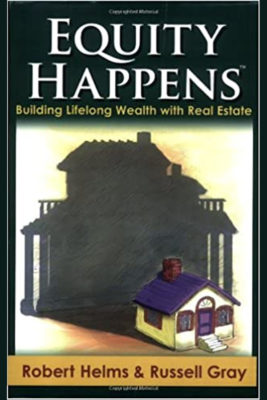
Equity Happens: Building Lifelong Wealth with Real Estate
You have a mitigation strategy so that if we have a fire, I know to run out this window or this door. If somebody breaks in the house, I know where the phone is and how to call 911, or maybe where the weapon is or however you choose to defend your home. Have a plan A if everything goes great. Have a plan B in case certain things go wrong. Try to anticipate as much as you can. To your earlier comment, understand there will always be an unexpected event that nobody saw coming that you couldn’t plan for. The best you can do is have some liquidity, have a great tribe, have some stability in your financials especially avoiding counterparty risk is one of the things that I’d be concerned about.
That way you may lose a piece of your portfolio, but you don’t lose a whole thing. Be ready for inflation, be ready for deflation, be ready for a banking collapse, be ready for hyperinflation. Be ready for high taxes, be ready for high-interest rates. None of those things may happen, all of them may happen, we don’t know. Something’s going to happen. Think it through, be ready, and have people on tap that you can tap into when you’re not sure what to think. If you make those investments now, then I think your future is bright come what may. I encourage you to do that.
There’s been so much we’ve covered. Russ, thank you. It’s always amazing talking to you and I definitely learned a lot.
I appreciate it. I’ll make it easy for everybody and makes it easy for you. They can send an email to WealthStandard@RealEstateGuysRadio.com. You get a quick autoresponder with the latest copy of our newsletter and links to everything that we do. That is if you’re interested, if not, then unsubscribe and no harm, no foul.
We’ll have to do a follow-up as things unfold.
I look forward to it.
—
Thank you for reading my interview with Russell Gray. He is an amazing guy and hopefully, you can follow the Real Estate Guys Radio Program. It’s an incredible podcast. They have awesome guests on. They’re insightful in the way in which they analyze things. You will get much value out of following them. Russ also writes his newsletter, which is also incredibly insightful, somewhat comedic. It’s informative and I believe you get a ton of value from it, plus it’s doesn’t cost anything. That’s it for now. Thank you for your support.
Important Links:
- Real Estate Guys Radio
- Instagram – Paradigm Life
- Facebook – The Wealth Standard
- Peter Schiff
- Investor Summit at Sea
- The Creature from Jekyll Island
- Freedom Fest
- Peak Prosperity
- Equity Happens
- Am I Being Too Subtle?
- The Dollar Crisis
- Club@RealEstateGuysRadio.com
- WealthStandard@RealEstateGuysRadio.com
- www.RealEstateGuysRadio.com
-
Show Notes Video: https://www.youtube.com/watch?v=3qg6pgfthzQ
About Russell Gray
 Russell Gray is co-host of The Real Estate Guys™ Radio and TV Shows. He has been a financial strategist since 1986. As a faculty member for the California Association of Realtors, Russ taught Real Estate Finance to Realtors® pursuing the prestigious GRI designation. He is a popular speaker and author.
Russell Gray is co-host of The Real Estate Guys™ Radio and TV Shows. He has been a financial strategist since 1986. As a faculty member for the California Association of Realtors, Russ taught Real Estate Finance to Realtors® pursuing the prestigious GRI designation. He is a popular speaker and author.
Robert and Russ have co-authored the very highly rated book “Equity Happens: Building Lifelong Wealth with Real Estate.”
Love the show? Subscribe, rate, review, and share!

